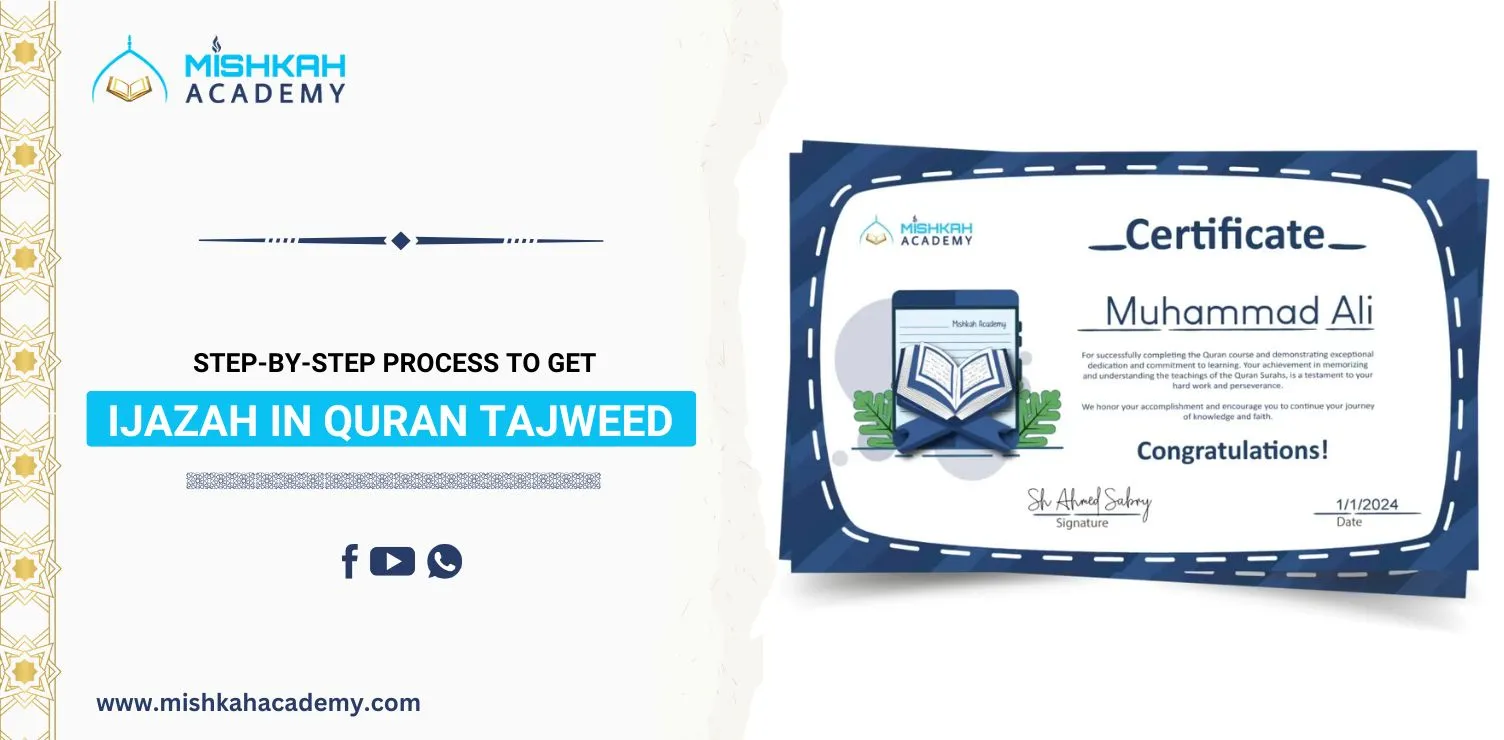Obtaining an Ijazah certification in Tajweed is essential for teaching the Quran correctly. It ensures you use the right tools and methods for accurate recitation and teaching.
To earn this certificate, follow these steps: understand what Ijazah means, join a recognized tajweed course, learn Tajweed rules, master Quran recitation, study with a qualified teacher, practice consistently, and pass exams to become certified. This guide simplifies the process to help you achieve your Ijazah certification.
What is Ijazah in Tajweed?
Table of Contents
ToggleIjazah in Tajweed is a formal certification that allows someone to teach Quran recitation with proper rules. It shows that you have mastered Tajweed and can pass it to others accurately.
This certification involves learning advanced recitation rules, studying with a qualified teacher, and practicing under their supervision. It is for anyone who wants to teach the Quran, including students, scholars, or teachers seeking deeper knowledge.
The time to get an Ijazah depends on your current skills and dedication. On average, it takes 1 to 3 years of consistent study and practice to complete the process.
Step-by-Step Process to Obtain Ijazah in Tajweed
Here are some steps shared by Mishkah Academy Quran tajweed tutors to obtain ijazah in tajweed.
Step 1. Understand the Meaning of Ijazah
Ijazah is an Islamic certification that authorizes you to teach the Quran and confirm your mastery of Tajweed. Without knowing what Ijazah truly means, it’s hard to appreciate its importance or commit to the journey.
Understanding it involves:
- Knowing its purpose: To preserve the Quran’s authenticity in recitation and teaching.
- Learning its history: Passed down from teacher to student for centuries.
- Recognizing its value: It certifies you as an authorized teacher of the Quran.
This step lays the foundation, giving you clarity about why the process is essential and preparing you for the effort ahead.
Step 2. Join an Accredited Ijazah Program and Enroll in the Course
Once you understand Ijazah, the next step is to find a reputable course. Accredited programs ensure you are learning from certified teachers who follow proper Quranic traditions.
- Look for a program with experienced teachers.
- Verify that the course is approved for awarding Ijazah.
- Ensure the curriculum includes Tajweed rules, practice, and testing.
Enrolling connects you with knowledgeable teachers and structured lessons. This step builds on the first by ensuring you’re guided correctly and have access to resources to master the Quran.
Step 3. Learn Basic Tajweed Rules
Before you can master recitation, you must understand the Tajweed rules that govern it. These rules ensure that every word of the Quran is pronounced accurately.
This step involves:
- Learning articulation points (Makharij).
- Studying characteristics of letters (Sifaat of huroof).
- Understanding elongation rules (Madd rules).
Building from the course enrollment, this step teaches you the technical foundations of Quran recitation, allowing you to read the Quran with precision.
Step 4. Master Quranic Recitation Skills
Mastering Quranic recitation requires consistent practice, as Tajweed rules become second nature through application. Daily recitation, guided corrections from a teacher, and listening to experienced reciters help refine fluency and rhythm.
The Prophet Muhammad (ﷺ) said,
“The best among you are those who learn the Quran and teach it“ (Sahih al-Bukhari, 5027)
This highlights the importance of perfecting recitation to teach it accurately. Through dedication and effort, you prepare for advanced learning and the honor of Ijazah certification.
Step 5. Study Under a Qualified Teacher/Sheikh
After mastering basic Tajweed and recitation, you need the guidance of a certified teacher. A qualified teacher or Sheikh ensures you follow the correct recitation techniques and corrects errors you may not notice.
- They have Ijazah themselves, ensuring authenticity.
- They provide personalized feedback, tailoring lessons to your needs.
- They share insights into Quranic rhythm, pronunciation, and tone.
This step continues the learning process, helping you refine your skills with expert supervision.
Start Your Tajweed Learning Journey Today
Step 6. Practice Consistently with Feedback
With a teacher’s guidance, consistent practice becomes your key to mastery. Daily recitation sessions help you internalize Tajweed rules and improve fluency in quran recitation. Teachers monitor your progress and offer feedback for improvement.
This involves:
- Reciting specific Quranic portions repeatedly.
- Correcting mistakes immediately.
- Practicing advanced Tajweed concepts, such as pauses (waqf).
All this allows you to make steady progress and gain confidence in your recitation. Regular practice ensures readiness for the final stages of earning your Ijazah.
Step 7. Pass Recitation and Written Tests
To receive Ijazah, you must pass tests that evaluate your recitation skills and understanding of Tajweed. These tests demonstrate your ability to teach the Quran accurately.
The tests involve:
- Reciting the entire Quran or selected portions with perfect Tajweed.
- Explaining Tajweed rules in detail.
- Answering written or oral questions on Quranic sciences.
This step validates the knowledge and skills gained from earlier stages. It ensures you can recite and teach with precision, fulfilling the requirements for Ijazah certification.
Step 8. Receive Certification and Start Teaching
Upon passing the tests, you receive your Ijazah, which formally qualifies you to teach the Quran. This certification is a testament to your dedication and mastery of Tajweed.
This final step is the culmination of your journey. It links back to the beginning, fulfilling the purpose of Ijazah—to preserve and pass on the Quran with perfection.
How Many Ijazah are There in the Quran?
There are two types of Ijazah in the Quran:
- Ijazah in Quran Recitation with Tajweed
This type of Ijazah is awarded to students who can recite the entire Quran accurately with proper Tajweed in front of a certified Sheikh or teacher. It qualifies them to teach others how to recite the Quran correctly. Subcategories include Ijazah in one narration (e.g., Hafs’ an ‘Asim), seven Qira’at (ash-Shatibiyyah), or 10 Qiraat (Tayyibat An-Nashr).
- Ijazah in Quran Memorization (Hifz)
This Ijazah is granted to those who have memorized the Quran word-for-word and can recite it flawlessly from memory. It is given after a student recites the Quran without a Mushaf in front of a qualified Sheikh, who ensures their accuracy and grants certification.
Can You Teach the Quran without Ijazah?
No, a teacher should not teach Quranic recitation beyond the widely accepted style in their region without Ijazah from qualified scholars. Ijazah ensures the teacher has mastered proper Tajweed and quran recitation rules, preserving the Quran’s authenticity.
Without Ijazah, mistakes in pronunciation or interpretation may occur, leading to incorrect teachings. The chain of transmission (Sanad) is critical in Quranic knowledge, and Ijazah validates a teacher’s ability to maintain this tradition accurately while respecting Islamic scholarly standards.
Conclusion
Reciting the Quran like a skilled Qari requires dedication, practice, and a strong grasp of Tajweed, pronunciation, and melody. For those seeking professional guidance, Mishkah Academy stands out as a leader in Quranic education.
With experienced tutors who specialize in advanced recitation techniques, Mishkah Academy offers personalized support to help students recite with mastery and confidence, just like renowned Qaris.






